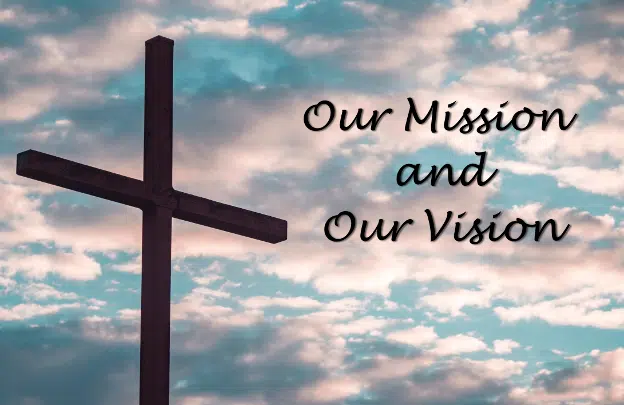OUR MISSION
The mission of FBC Bellingham, MA is the same mission Jesus gave his followers: “Go therefore and make disciples of all nations, baptizing them in the name of the Father and of the Son and of the Holy Spirit (Matthew 28:17-20).” Our mission and hope is to lead people to love and live for Jesus in Bellingham, Norfolk County and throughout the world.
First Baptist Church of Bellingham exists to EXALT THE LORD, EDIFY THE SAINTS, AND EVANGELIZE THE LOST
OUR VISION
The Vision of First Baptist Church of Bellingham is to transform Bellingham and the surrounding towns with the Gospel of Jesus Christ. In the coming years, we will strive to expand our gospel outreach, to personally grow in the grace and knowledge of Jesus Christ, and to create a personal impact in our community. First Baptist Church will build a reputation for upholding sound doctrine, presenting the love of Christ, and providing spiritual support for all people.
Biblical authority (2 Timothy 3:15-17; 1 Thessalonians 2:13; 2 Peter 1:20, 2 Peter 1:21)
The Bible is the final authority in all matters of belief and practice because the Bible is inspired by God and bears the absolute authority of God Himself. Whatever the Bible affirms, Baptists accept as true. No human opinion or decree of any church group can override the Bible. Even creeds and confessions of faith which attempt to articulate the theology of Scripture do not carry Scripture’s inherent authority.
Autonomy of the local church (Colossians 1:18; 2 Corinthians 8:1-5, 2 Corinthians 8:19-23)
The local church is an independent body accountable to the Lord Jesus Christ, the head of the church. All human authority for governing the local church resides within the local church itself. Thus the church is autonomous, or self-governing. No religious hierarchy outside the local church may dictate a church’s beliefs or practices. Autonomy does not mean isolation. A Baptist church may fellowship with other churches around mutual interests and in an associational tie, but a Baptist church cannot be a “member” of any other body
Priesthood of all believers (1 Peter 2:5-9; Revelation 5:9-10)
“Priest” is defined as “one authorized to perform the sacred rites of a religion, especially as a mediatory agent between humans and God.” Every believer today is a priest of God and may enter into His presence in prayer directly through our Great High Priest, Jesus Christ. No other mediator is needed between God and people. As priests, we can study God’s Word, pray for others, and offer spiritual worship to God. We all have equal access to God-whether we are a preacher or not.
Two ordinances (Matthew 28:19,20; 1 Corinthians 11:23-32)
Two commands issued and instituted by Christ to His Church to be obeyed are Believers’ Baptism and the Lord’s Table. An “ordinance” is a picture of saving truth, as opposed to a “sacrament”. Immersion is the only acceptable mode for baptism because it alone preserves the picture of saving truth. No other form pictures the death, burial, and resurrection of Christ. The Lord’s Table (also called The Lord’s Supper or communion) is a symbolic ordinance, picturing Christ’s body broken for our sins and His blood shed for our redemption. It helps us remember His death, and inspires us while looking forward to His coming.
Individual soul liberty (Romans 14:5-12; 2 Corinthians 4:2; Titus 1:9)
Every individual, whether a believer or an unbeliever, has the liberty to choose what he believes is right in the religious realm. No one should be forced to assent to any belief against his will. Baptist have always opposed religious persecution. However, this liberty does not exempt one from responsibility to the Word of God or from accountability to God Himself.
Saved, baptized church membership (Acts 2:41-47; 1 Corinthians 12:12; 2 Corinthians 6:14; Ephesians 4:3.)
Local church membership is restricted to individuals who give a believable testimony of personal faith in Christ and have publicly identified themselves with Him in believer’s baptism. When the members of a local church are believers, a oneness in Christ exists, and the members can endeavor to keep the unity of the Spirit in the bond of peace.
Two offices of the church (pastor and deacon) (1 Timothy 3:1-13; Acts 20:17-38; Philippians 1:1)
The Lord has established two offices, Pastor and Deacon, to minister to His flock. There is no additional hierarchy of offices. Pastors are also called bishops, overseers, or elders in the New Testament. Deacons are given to help the pastor in the daily administration and decision making of the church.
Separation of Church and State (Matthew 22:15-22; Acts 15:17-29)
God established both the church and the civil government, and He gave each its own distinct sphere of operation. The government’s purposes are outlined in Romans 13:1-7 and the church’s purposes in Matthew 28:19-20. Neither should control the other, nor should there be an alliance between the two. Christians in a free society can properly influence government towards righteousness, which is not the same as a denomination or group of churches controlling the government.
